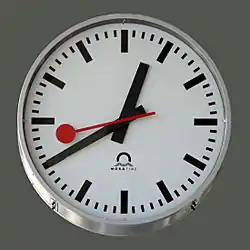Swiss railway clock
The Swiss railway clock was designed in 1944 by Hans Hilfiker, a Swiss engineer and SBB employee, together with Moser-Baer, a clock manufacturer, for use by the Swiss Federal Railways as a station clock.[1] In 1953, Hilfiker added a red second hand in the shape of the baton used by train dispatch staff.[2]
 A Swiss railway clock at Zürich HB | |
| Manufacturer | Moser-Baer / Mobatime |
|---|---|
| Type | Electric clock |
| Display | Analog |
| Introduced | 1944 |
| Movement | Synchronous motor |
Since then it has become a Swiss national icon,[3][4][5] included among examples of outstanding 20th-century design by both the Design Museum in London and the Museum of Modern Art in New York City, and its clockface design is licensed for use on certain Apple devices such as iPads and iPhones.[2] Apple initially used the clock design without permission in iOS 6.[6][7] Although the exact details of the licensing agreement are confidential,[8] it was reported that Apple ultimately paid Swiss national rail operator SBB about CHF 20M (about US$22.4M as of January 2014) to license the use of the clock design.[9] Apple later removed the design from its operating system with iOS 7.[10]
Technology

The clock owes its technology to the particular requirements of operating a railway. First, railway timetables do not list seconds; trains in Switzerland always leave the station on the full minute. Secondly, all the clocks at a railway station have to run synchronously in order to show reliable time for both passengers and railway personnel anywhere on or around the station.[4]
The station clocks in Switzerland are synchronized by receiving an electrical impulse from a central master clock at each full minute, advancing the minute hand by one minute. The second hand is driven by an electrical motor independent of the master clock. It requires only about 58.5 seconds to circle the face, then the hand pauses briefly at the top of the clock. It starts a new rotation as soon as it receives the next minute impulse from the master clock.[4] This movement is emulated in some of the licensed timepieces made by Mondaine.
See also
References
- "Ahead of time". SBB Stories. 2017-10-25. Retrieved 2017-10-28.
- "Apple gets OK to use Swiss railway clock design". Reuters.
- "Remarkable clocks and watches: the Swiss railway clock". swissworld.org. Berne, Switzerland: Presence Switzerland, Swiss Federal Department of Foreign Affairs FDFA. Retrieved 2014-12-11.
- Köbi Gantenbein, ed. (2013). Die Bahnhofsuhr – Ein Mythos des Designs aus der Schweiz (in German). Zurich, Switzerland: Edition Hochparterre. Archived from the original on 2014-11-04. Retrieved 2014-10-19.
- "Mobatime – Swiss Time Systems: References". Sumiswald, Bern, Switzerland: MOSER-BAER SA. Retrieved 2014-10-19.
- "Apple kopiert die berühmte SBB-Uhr". Tages-Anzeiger (in German). Zurich, Switzerland: TA Media AG. 11 November 2012. Retrieved 2014-12-11.
- "Swiss rail claims Apple copied its iconic clocks". Yahoo News.
- "SBB and Apple Sign Licence Agreement". PRNewswire.
- Adrian Sulc (11 November 2012). "Der Streit mit Apple schwemmt Millionen in die SBB-Kasse". Tages-Anzeiger (in German). Zurich, Switzerland: TA Media AG. Retrieved 2014-12-11.
- "Apple's mobile iOS 7 gives up Swiss train clock". Geneva Lunch.